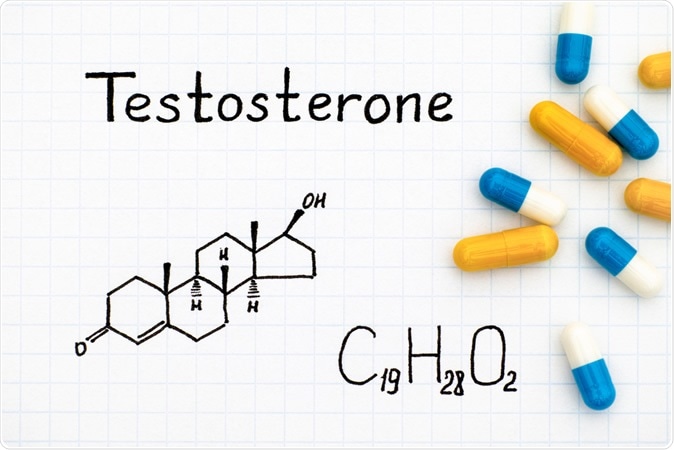Testosterone is a steroid hormone that triggers the development of male secondary sex characteristics. Though found mainly in men, the ovaries in women release small amounts of testosterone. When combined with estrogen, testosterone aids in the growth and repair of a woman's reproductive tissues.
Having genetically higher testosterone levels in women is linked to a higher risk of developing diabetes, metabolic disease, and cancer, a new study found. The link has been associated with women and not in men. The risk of these diseases is reduced in men with higher levels of testosterone.
The researcher by scientists at the Medical Research Council (NRC) Epidemiology Unit at the University of Cambridge is published in the journal Nature Medicine.

Chemical formula of Testosterone. Image Credit: Ekaterina_Minaeva / Shutterstock
High risks of diseases
They revealed that women with genetically higher testosterone levels have a heightened risk of developing type 2 diabetes by 37 percent. On the other hand, men had a reduction of type 2 diabetes risk by 14 percent if they had higher testosterone levels.
The women also had a 51-percent increased risk of polycystic ovary syndrome (PCOS). PCOS was previously thought to have caused high testosterone levels.
Further, findings of the study unveiled that higher testosterone levels in women had been tied to a higher risk of developing cancer, including endometrial and breast cancer. In men, high levels of the hormone are linked to higher prostate cancer risk. The team concluded that there is a genetic component to testosterone levels in both sexes, but the effects were very different between men and women.
The largest study to date
The study was the largest one to date on determining the genetic regulation of hormone levels. The team used genome-wide associations studies in more than 425,000 participants in the UK Biobank and had identified 2,571 genetic variations linked to differences in levels of the sex hormone testosterone.
The team demonstrated that the genetic determinants of testosterone levels are different between sexes, and it may be beneficial for the health of men in terms of metabolic diseases but may be detrimental for women.
"Our findings that genetically higher testosterone levels increase the risk of PCOS in women is important in understanding the role of testosterone in the origin of this common disorder, rather than simply being a consequence of this condition," Dr. John Perry from the MRC Epidemiology Unit at the University of Cambridge, said in a statement.
"Likewise, in men, testosterone-reducing therapies are widely used to treat prostate cancer, but until now it was uncertain whether lower testosterone levels are also protective against developing prostate cancer. Our findings show how genetic techniques such as Mendelian randomization are useful in the understanding of the risks and benefits of hormone therapies," he added.
The researchers noted that the study highlights the importance of sex-specific analyses on testosterone levels and their effect on health. The study findings shed light on the impacts of testosterone in the body and how to curb abnormal levels to improve quality of life and ward off metabolic diseases, which can lead to disability and premature death, if not treated appropriately.
What is metabolic disease?
Metabolic disease, also known as metabolic syndrome, is an umbrella term for a cluster of conditions that occur together, increasing the risk of heart disease, type 2 diabetes, and stroke. The common conditions present in metabolic syndrome include excess body fat especially around the waist, elevated blood pressure, high blood sugar levels, and high cholesterol or triglyceride levels.
Journal reference:
Ruth, K.S., Day, F.R., Tyrrell, J. et al. Using human genetics to understand the disease impacts of testosterone in men and women. Nat Med 26, 252–258 (2020). https://doi.org/10.1038/s41591-020-0751-5